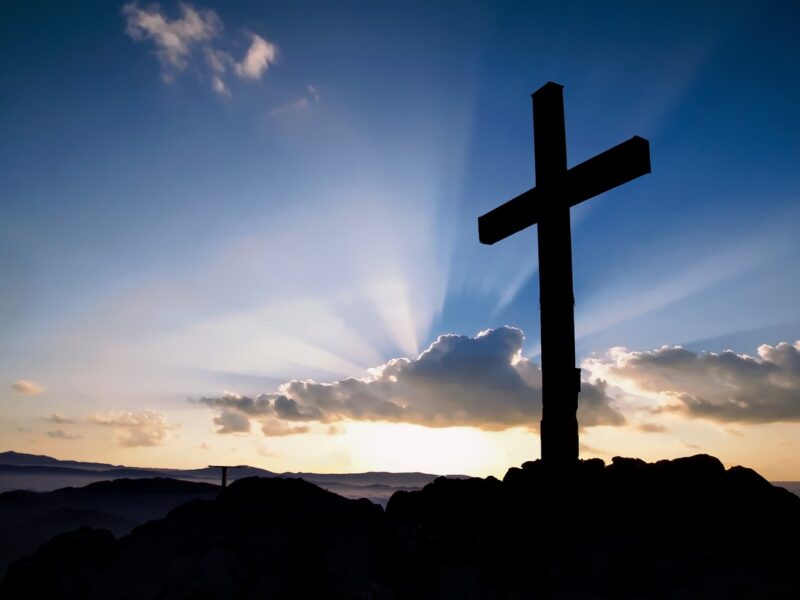Some time ago, I read an article posted by Christianity Today entitled “Why conservation is a gospel issue.” The article was an interesting article about environmental stewardship, and I don’t have a lot of complaints about the content. It was the title that bothered me.
The following article has been reblogged with permission from Todd’s Blog. The views expressed reflect those of the author, and not necessarily those of New Creation.
I’ve heard the phrase “it’s a gospel issue” before. Creationists have been known to use it to describe young-age creationism. I personally find the phrase a little alarming, especially in light of the gospel itself. Paul tells us in 1 Corinthians,
Now I would remind you, brothers, of the gospel I preached to you, which you received, in which you stand, and by which you are being saved, if you hold fast to the word I preached to you—unless you believed in vain. For I delivered to you as of first importance what I also received: that Christ died for our sins in accordance with the Scriptures, that he was buried, that he was raised on the third day in accordance with the Scriptures, and that he appeared to Cephas, then to the twelve.
– 1 Corinthians 15:1-5, ESV
Notice what is contained in this biblical definition of the gospel: Christ died for our sins, was buried, and rose again. In other passages of the New Testament, we find the gospel used to describe Jesus Christ. Indeed, we use the word gospel to describe the first four books of the New Testament, all of which discuss the life and work of Jesus. Jesus is the gospel.
I find it alarming to describe conservation or creationism with the term “gospel issue” because they are not directly the gospel. The gospel is not about when God made the universe, and it is not about how we care for creation today. The gospel is about Jesus and how we obtain life through Him. We ought not add to the gospel other things, important though they may be.
Another reason for my discomfort regarding the “gospel issue” is that it is too often used as a weapon to beat up those who disagree with the person using it. The implications should be obvious (and they are): When I say that my favorite doctrine is a “gospel issue,” I am implying that people who disagree with me are probably heretics and maybe not even Christians. That’s not a very gracious thing to do, but Christians do it all the time. Just google “gospel issue” and see the range of issues described by that phrase. It really should bother you.
I’m not suggesting that these issues are not important, but we need a different way to say that issues are important. D.A. Carson wrote this recently in a paper in Themelios:
On the one hand, because of the complex entanglements of theology, with a little imagination one might argue that almost any topic is a gospel issue. At one level or another, everything in any theology that is worth the name is tied to everything else, so it is possible to tie everything to the gospel. In that sense, well-nigh everything is a gospel issue.
Here’s a silly example of what he’s talking about: Since the Bible reveals to us the story of Jesus we must believe it to be saved. So if you don’t believe that King Amaziah’s mother was Jehoaddin, then you’re questioning the authority of the Bible and that’s a gospel issue! Most of you probably don’t even know who I’m talking about. I just skimmed 2 Kings to find some obscure trivia to illustrate my point (she’s mentioned in 14:1-2).
You can see how silly that is, and you might want to say that there are really important doctrines that are gospel issues. For example, I happen to think that the doctrine of the Fall is a really important doctrine that directly relates to the central Christian theological message of creation/fall/redemption. But the Fall is not itself the gospel, and according to 1 Corinthians 15, it doesn’t even seem to be part of the gospel. Does that make it unimportant? Only if you see theology as having two dimensions of importance: Gospel issues and everything else.
This is yet another one of my pet peeves. It seems like Christians desperately want to categorize doctrines as vitally important or not important at all, usually depending on whether you’re on the offense or defense. I can’t remember how many times I’ve heard someone condescendingly tell me that creationism is a “secondary issue.” What they really mean by that is, “It’s not important so you shouldn’t get all worked up about it.” But that’s not true at all. The Apostle’s creed starts right off with “I believe in God the Father almighty, maker of heaven and earth.” The doctrine of creation is important, and insofar as the method of creation reflects the divine power and character of God, how He created is also important.
Does that mean I should say that it’s a “gospel issue?” Not at all. That would be just as wrong. The gospel is the story of Jesus’ salvation. The question of how God created is important because it is connected to salvation, but it is not itself the way to salvation. It is not the gospel.
The most alarming part of all of these “gospel issues” is that they seem to be adding to the gospel. The gospel is not the story of Jesus’ salvation + my favorite doctrine. Even if those doctrines are true (and important), we should not attach them directly to the gospel. The Bible has very strong words for people who try to place extra burdens on people in addition to the gospel. That makes a false gospel. Ironically, it seems to me that calling things “gospel issues” is an actual gospel issue.
So please, let’s find some other way to describe how important things are. Let’s be specific about the theological implications that we see. Let’s not just beat up our ideological enemies by declaring our position a “gospel issue” when it really isn’t.












Todd, I really appreciate what you have said. Christians are increasingly fuzzy on the gospel, and they mistakenly think that everything the Bible teaches is the gospel. Not so! The gospel is the good news about what God has done for us in history (outside of ourselves) in the Person of Christ – His perfect life and substitutionary death for our sins. See 1 Cor 15:1-5. Other truths like creation are related to the gospel, but they are not the gospel itself. So only things that specifically pertain to the Christ Event are gospel issues.
Luke 24: 27 Then, beginning with Moses and all the Prophets, he explained to them all the passages of Scripture about himself.
I would argue with this Passage that the textbook for gospelpreaching was the OT for the early Christians. And that we ought not to neglect this fact.
When Paul refers to the fall of Adam as the Person through whom sin and death came into the world then we cant neglect the question of his historicity, which brings us directly to the question of creation.
And since right after the fall God promises the one who would eventually crush the serpent’s head the story of the fall is as much a gospel issue as the creation is.
Apg 3:18 ISV This is how God fulfilled what he had predicted through the voice of all the prophets—that his Messiah would suffer.
Eugen, the issue in my thinking is not whether people SHOULD believe in the historicity of the Old Testament – they should – but whether that is an essential element to conversion to Christ Jesus. If one is transformed by the Holy Spirit, He will mature the person and conform their thinking to a Biblical worldview over time.
.
One of my bones I have to pick with young creationists is their unstated implication that one must believe the world is only 6,000 years old to accept Christ. This is an example of what the problem Mr. Wood is addressing.
Hello Sir,
Thank you for sharing your perspective. I truly value the thought and conviction behind your viewpoint, and I can see where you’re coming from.
I personally agree with the author of the blog on this topic. Scripture tells us that the Holy Spirit convicts the world of truth and sin, guiding us toward understanding. It also clearly states that Jesus died for our sins, rose from the dead, and that if we want to live with Him forever, we are called to believe in His person and work, surrendering our lives to Him as our Savior and Lord.
Considering your response, I want to explore this idea further. If someone believes in Jesus, His death, and His resurrection, but holds a different view on the age of the earth or other theological matters, would that mean they’re not saved? It seems to me that such a conclusion might distract us from the central message of salvation through Christ.
We are saved by grace through faith, and as we grow in our relationship with Jesus, we also grow in our understanding of theological issues. These matters, while important, don’t determine our salvation. Instead, they should deepen our relationship with Christ and encourage unity rather than division among believers.
Do you think Scripture encourages us to divide over these issues, or might it call us to focus on what truly unites us in Christ?
Al Gore had 2500 seminary preachers trained to preach a false gospel of global warming which is now called climate change. Obama had 1500 seminary preachers trained to preach a false gospel of strict obedience to the government. I don’t know if this is where this talk of conservation and creation gospel your speaking about came from, but it wouldn’t surprise me if it is. The Old Testament clearly shows that false prophets were common in Israel, so its no different today.
In Revelation 14:6-7 “the “everlasting gospel” preached by an angel to the whole world does not mention the death, burial or resurrection of Christ. It does however mention God as Creator.
In Hebrews 11 we are remined that is by faith we understand that the universe was formed at God’s command, so that what is seen was not made out of what was visible and that without faith it is impossible to please God.
Romans 1 reveals the wrath of God comes upon the world because even people know there is a Creator God, they suppress this truth.
John 3:16-21 does not mention the death, burial and resurrection of Christ.
In his evangelistic preaching in Acts 17, the apostle Paul refers to the fact that God made all the nations of mankind “of one”– which most interpreters take to mean of one blood, or of one father– namely, Adam. This was necessary to show the Athenians the unity and fallennes of the human race, since they tended to see themselves as disconnected from the rest of mankind. In his explanation of Christ´s saving work, Paul describes Jesus as the “last Adam” and constantly points out that Christ´s saving work in obtaining righteousness only makes sense against the backdrop of the fall of mankind into sin through the sin of one man, Adam. God´s solution to our plight cannot be understood correctly unless the nature of our plight is understood, as something that “came upon” the race through the rebellion of the common forefather of all. I am inclined, therefore, to say the doctrine of the fall is a gospel issue, in that the gospel will be fundamentally altered in its doctrinal content without it. We will fail to grasp the gospel if we fail to grasp the nature and origin of man´s plight. If there is no historic fall, sin becomes more of a metaphysical or existential problem stemming from human finitude or from the limitations imposed by an evolutionary past, rather than an ethical problem that has its roots in the rebellion of the first man, on account of whom all human beings inherit a sinful nature as Adam´s spiritually lost sons and daughter and are by nature “children of disobedience” and “children of wrath”, slaves of sin “in Adam.” How can the fall not be seen as a “gospel issue”, therefore? An effective cure depends on a proper diagnosis of the disease. I personally believe any group that denies the historic fall of man in Adam is losing touch, not merely with something important, but with a “gospel essential.”
I have a different “word” I use in my thought process. Is it a “salvation” issue? Will not believing the earth and the entire universe is only “X” years old keep me from salvation? God has no limits as to waht he can do with just speaking a Word. If He chose to make the universe in just “X” years but make it look millions of years old, He could do that. No, not in my mind.
Like the article says, creation is an important doctrine, it is an important part of our understanding of God’s nature and character but NOT a “gospel issue”. The question is settled simply by asking; if some says they believe God is created all things, is that enough to say they are saved?
There is no question that creation is an important doctrine that adds to our understanding about the nature and character of God but it is not a: “gospel issue”. The issue is resolved by simply turning the question around and asking: If a person says they believe that God created the world and everything in it, is that enough to save them?
Thank you for your clarity in describing an important issue related to Christianity. We need to clearly identify what the gospel is and communicate it to those who are lost and not add additional burdens to it. As a person grows in Christ he/she will understand those issues as they intake God’s word and make it part of their lives.
If you do not believe that Genesis is the literal word of God (as I believe Jesus expressed), how can you believe any of the Scriptures — including the Gospel message itself — to be true?
Todd, I think you may have subtly misrepresented the creationist viewpoint. Young earth creationists don’t infer that if you don’t believe in a literal 6-day creation you aren’t saved. Rather, they are saying that the gospel doesn’t make sense without a literal interpretation of Genesis 1-3. They claim that an old-age view of creation and a non-literal interpretation of Genesis 1-3 involves an illogical break in the causal chain of events that led to Christ’s sacrifice on the cross for our sins. Christians who trust in Christ but don’t believe in a literal 6-day creation are most certainly saved, but young earth creationists simply point out that there is an underlying logical and causal inconsistency in a belief system that rejects a literal reading of the creation narrative. If, as the long-age evolutionary viewpoint asserts, death was an integral part of creation for millions of years before mankind sinned and, therefore, part of God’s intentional “evolutionary” design for the world, this contradicts the New Testament teaching that death only entered the world after Adam and Eve sinned. This, in turn, has implications for our understanding of Jesus, as the “second Adam” who came to redeem us from the power of sin and the curse of death – a curse that was only enacted on day 6 of creation. You are correct in saying in your article that belief in a literal 6-day creation is not a salvation issue (in the sense that if one doesn’t believe it, one isn’t saved), but that is not what young earth creationists are saying. They simply point out that there is a logical, causal connection between the 6-day creation account and the saving work of Christ which most people don’t appreciate. A literal interpretation of Genesis 1-3 makes sense of Christ’s salvific work, whereas a non-literal interpretation involves a break in causal logic. Furthermore, I point out that your claim that if a point of doctrine is not specifically listed in 1 Corinthians 15:1-5 then it isn’t an essential part of the gospel is overly simplistic and reductionist. On this view, belief in Christ’s divinity is not an essential part of the gospel, because this passage makes no mention of it! In 1 Corinthians 15:1-5 Paul is NOT providing an exhaustive definition of the gospel. Rather, he is addressing some heresies in Corinth and is selectively highlighting only the specific elements of the gospel that address and refute those heresies – Jesus’ literal death (rather than the rumoured swooning) and his literal bodily resurrection (rather than a supposed mere spiritual resurrection). By claiming, as you have done in this article, that only those doctrinal elements mentioned by Paul in this passage comprise the quintessential gospel and anything outside those elements is secondary and non-essential you have failed to appreciate the context of this passage and its purpose. You have inappropriately and too narrowly defined the gospel beyond the accepted tenets of orthodoxy which would insist on other elements such as Christ’s divinity, his sinlessness and our inherent sinfulness as essential elements. That Paul is not proposing an exhaustive definition of the gospel in 1 Corinthians 15:1-5 but is picking out just a couple of points from a wider definition is evident in his statements that “Christ died for sins in accordance with the scriptures” and that he was “raised on the third day according to the scriptures” (verses 4 & 5). Here is is appealing to a much wider body of teaching regarding the complete gospel; a body of teaching that he is not, at this point, feeling the need to repeat or even summarise, because he is only dealing with a couple of very specific issues. I have written about this topic more fully on my website, smartfaith.net
Having made my previous comments, let me qualify that by saying that I agree with the general gist of your article. Although I am a young earth creationist (YEC), I find that I want to distance myself from the over-reach of some YEC’s who propose that a literal 6-day is essential to the gospel. While a literal 6-day interpretation, in my opinion, makes much more sense of the whole gospel narrative, it is certainly not central and fundamental in a salvific sense. We are saved by our faith in Christ and not by our faith in 6-day creationism.
While a clear and honest presentation of the Gospel is demanded, the creation related issue is sometimes clouded by attempts to re-order the events in history by means of long-age where death is claimed to have come before sin. If this is allow to cloud the issue, than death is not the product of sin, and Jesus is ‘out of a job’…
I agree that believing in a seven-day creation is not essential for salvation. I am concerned when a person says they are a mature believer and does not believe in a seven-day creation. A real believer will be reading and studying God’s Word. If a person reads the Bible with a desire to know their Lord and Savior, they should come to the conclusion that Jesus and Paul believed the creation story, so maybe they need to believe it.
If we don’t believe and obey the Word, then we are not effectively carrying out the great commission, and therefore our disciple making (sharing the Good News) is thwarted. If we cannot share the Truth with conviction, (think Paul in Athens explaining Truth to a culture that did not know of the One True God to lead them to God, Jesus, and the Gospel) then it is doubtful we can share the Gospel with conviction.
The 2 Kings obscure reference is a red herring and a very weak argument. The name of the wife of a king compares “equally” to the Truth about creation of the universe?? Huh??
I believe the issue is that without the supporting “important” doctrine, the central gospel loses it’s rational. The good news about Jesus isn’t good news if you don’t understand why you need a Savior who did what Jesus did.
Major fail, Todd.
If evolution is true, then we necessarily separate sin from death. If evolution is true, then death is a necessity of creation, and part of God’s “creative” process for bringing about new life. If evolution is true, then the death of Adam is not the result of sin (“On the day that you eat of it you shall die,” which did happen in Adam relationship to God and therefore eventually in his physical person), but is instead the innate nature of creation as God designed it.
Here’s the rub. If we separate the connection between the sin of Adam and the death of Adam, who is but the first Adam, then we revise the meaning of the death of the second Adam, Jesus. Jesus didn’t die because of His commitment to a cause, or to be an example for us to live lives of self-sacrifice. Jesus died because “God made him who had no sin to be sin for us” (2 Cor. 5:21). Jesus died not only because the human courts judged Him guilty, but because the Father judged Him guilty with my sin and yours. Jesus died because our sin was placed on Him.
If you change the meaning of the death of the first Adam, as evolution necessarily does, you change the meaning of the death of the second Adam. Jesus died because He bore the curse of my sin. Evolution says, “Not so fast. Deathbisn’t really a sin issue.”
I once challenged a Roman Catholic priest about this (and the RC’s are all in on evolution–it is assumed to be true in all of their confirmation materials), and told him, if you proclaim evolution to be true, you have changed the meaning of the crucifix (and I like crucifixes) that hangs above every Catholic altar. Thrbpriest had no reply, other than “I’ll have to think about that.”
Yes, Todd, evolution is a Gospel issue. (Beyond that, it asserts human “wisdom” over Scripture, and then the dominoes fall from every direction.)
…and yet I talk to so many people who dismiss the entire Bible because they think Genesis is mythology. You can’t share the Gospel with someone who thinks it’s all based on myths
That was a wonderful post. I am bothered by all the important things people want to turn into a gospel issue — or a salvation issue. As you say, the gospel is that Jesus died for our sins, was buried, and rose again. That is how we are saved. I do not discount the importance of sound doctrine and confidence in scripture, but the gospel is Jesus and His atoning work on the cross.
If evolution, even God-directed, is true, then death has no connection to sin, but was designed by God from the beginning. But if death is not caused by human sin, then how can the death of Jesus atone for sin? That is why creation is central to the Gospel.
While I agree that the creation story and environmental stewardship are not part of the gospel, I disagree with your defense of that issue. In 1 Corinthians 15, Paul does not say that his description of the gospel is the full gospel. In fact, it is not. Paul is addressing a particular portion of the gospel that the Corinthians were denying (the resurrection of the Christ). Certainly, Paul would include the coming of the kingdom (mentioned later in the chapter) as well as the giving of the Holy Spirit (Romans 8) as part of his gospel.
Todd, I understand your viewpoint, but I believe you prove yourself wrong at the very end. The inclusion of creation in the Apostle’s Creed makes it an essential doctrine, whereas “conservation” is not a creedal issue.
If you prefer “creedal issue,” rather than “gospel issue,” then I would agree.
I will ask you, why is the gospel of Jesus needed? Did something happen to mankind right at the beginning of creation that made the gospel necessary? If the gospel is just: Christ died for our sins, was buried, and rose again. Why are we in bondage to sin and in need of a savior?
To some of the comments in here stating that “Paul talked about x or y while preaching the gospel, so it is a gospel issue” I would say:
There is a difference between the gospel message itself, and the various background information that one might need to present before/alongside the gospel, based on the culture, background or existing knowledge of the hearer.
Preaching the gospel to a group of Jews who already have the Old testament, is going to sound a lot different than preaching the same gospel message to a group of animists who have never heard of Yahweh etc.
It would not be accurate to look at these two gospel presentations and take all of the background information/context that is given alongside the gospel, and say that it is part of the Gospel.
Similarly in Scripture there are numerous accounts of sharing the gospel, all of which had slightly different context based on the hearer. We ought not read back into the gospel message itself, the surrounding preaching that was given as a means to help understand or frame the gospel.
The Gospel makes no sense without the Doctrine of the Fall. So …
2 PETER 3:8-9
THIS SCRIPTURE SHOULD BE EASY FOR US TO TAKE NOTICE, THAT GOD DOES NOT OPERATE IN THE CONFINES OF SPACE AND TIME , AS WE KNOW IT. GOD ESTABLISHED ALL HIS CREATION FOR US TO FUNCTION IN. ONCE HAVE BEEN PERFECTED, WE WON’T BE CONFINED AS WE ARE NOW.
IN OUR FINITE MINDS , WE CAN’T COMPLETELY CONCEIVE HOW GOD OPERATES. JESUS TOOK ON HUMAN FLESH AND HE HAD TO ABIDE IN THE CREATION AS WELL.
HE HAD SUPERNATURAL POWER, BUT, HE CHOSE TO TAKE ON A HUMAN BODYTO BECOME THE SINLESS SACRIFICE FOR OUR SINS.
ONE DAY ,WHEN WE ARE IN THE VERY PRESENCE OF GOD, WE WILL SEE THINGS DIFFERENTLY AS GOD REVEALS THE SECRETS OF ETERNITY AND HIS ETERNAL EXISTENCE TO US
Even very conservative evangelical NT scholars admit there may be fictional stories in the Gospels. The question is: Which ones??
https://lutherwasnotbornagaincom.wordpress.com/2024/12/08/evangelical-scholar-craig-blomberg-admits-the-gospels-may-contain-fiction/
Hi Gary, I think you are overstating your case. You cite one evangelical scholar who, to my knowledge, is on the liberal end of the conservative spectrum. That does not equate to multiple very conservative scholars admitting to fiction in the gospels. There are varying views on the Gospels’ authorship. Still, I suspect that most conservative evangelicals would say that they were written by either firsthand witnesses or people who interviewed first-hand witnesses. That allows very little wiggle room for fiction to creep in.
If you assume that an eyewitness would never embellish his story of allegedly seeing a back from the dead corpse. What if all of the eyewitnesses originally claimed to have seen only what Paul claims in Acts 26 that he saw: a talking bright light? Everybody saw bright lights and believed they were appearances of Jesus. The authors of the Gospels thought these stories were boring so they “spiced up” the Jesus sightings.
If the events were fabricated simply to spice things up, is highly unlikely that multiple disciples would have faced torture and death for their faith without changing their story.